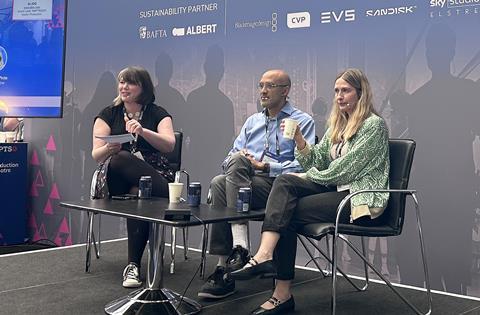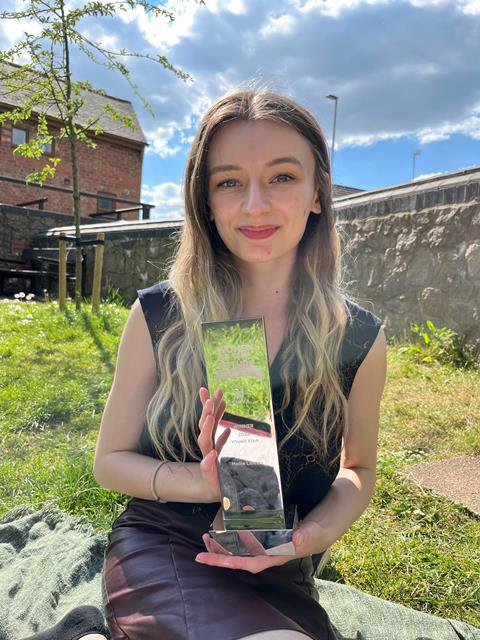Poor working conditions, deadline pressure and uncertain employment are pushing many people in TV and film to breaking point – but there is help available, according to a recent panel at the Media Production & Technology Show
“I’m not going to mince my words,” says Marcus Ryder, chief executive of the Film and TV Charity (FTVC). “There’s a mental health crisis in the industry.”
The available data backs him up. Last year’s Looking Glass Survey of more than 4,300 film, TV and cinema workers found that almost one in three (30%) had thought about taking their own life in the past year – compared with just 5% of people in the general population. Almost two in three (64%) were considering leaving the industry and half of those had taken the first steps to do so.
Overall, just 12% of respondents said they felt the industry was a “mentally healthy place to work”.
The FTVC offers financial and mental health support to workers in the industry, and last year more than 10,000 people engaged with its mental wellbeing services, including the charity’s helpline and counselling support.
The figures, Ryder says, are “stark”, and addressing the industry’s poor mental health will require structural changes.

He’s speaking on a panel at the Media Production & Technology Show in central London in May, alongside Michelle White, co-director of 6ft From The Spotlight, an organisation that supports mental health in the production sector and provides on-set wellbeing co-ordinators.
Both agree that a maelstrom of poor working conditions and management, tight deadlines, precarious employment and uncertainty about the wider industry has created the current crisis.
And, White says, it can become a vicious circle. “The human brain hates uncertainty – people will not thrive in uncertain environments,” she says. “They will use a lot of maladaptive or negative coping behaviours to try to deal with it.
“We’re seeing people accepting working conditions that they probably shouldn’t because they are worried about having no other job to go to, and we see a lot of victimisation.”
And the age-old problem that those who experience bad treatment stay silent for fear of being branded troublemakers has grown worse in the past year, she says.
“For a long time, we didn’t expect the industry to be a mentally healthy place to work”
Marcus Ryder, FTVC
For Ryder, the current uncertainties caused by the commissioning slowdown have exacerbated historical cultural issues that the industry has long failed to face up to.
“When I started work in the 1990s, there was a level of dysfunction that had been normalised,” he says, adding that in his experience at both the BBC and other broadcasters, “for a long time, we didn’t expect [the industry] to be a mentally healthy place to work”.
“We were not surprised when we saw functioning alcoholics going to the BBC bar or when we saw marriages breaking down – we just thought that this was a consequence of working in broadcast,” he says.
Resetting the norm
Such difficulties were seen as “earning your stripes”, Ryder says, to the point where, in his early days as a manager, “I didn’t believe, in my heart of hearts, that we could actually create great programmes and work decent hours”.
“I was wrong, and I was humbled by discovering that,” he adds, but unless managers see healthier working conditions being effective in practice, he says, many will continue to believe that 12-hour days and shouting at colleagues are the only ways to produce great work.
Ryder also acknowledges that many of the issues currently facing producers and directors, such as precarious work and unstable working patterns, have affected craft and post roles for decades.

White agrees that a “mindset shift” is crucial to resolving the crisis, and argues that leadership and management training could help achieve this.
“TV environments tend to be extremely psychologically unsafe environments,” she says. “But the elements of a safe environment are free, they don’t cost anything to implement.”
TV productions will always be “fast-paced, high-pressure, creative environments”, she says, and there’s nothing wrong with that – but they shouldn’t be fearful ones.
Ultimately, she says, most of the experiences of poor management behaviour and bullying stem from manager ignorance and lack of training rather than malice.
Ryder compares the situation to the growing awareness of the importance of health and safety over the past 30 years – in the early days of his career, he points out, there simply was no requirement to fill out risk assessments or to consider health and safety.
“Then there was a major shift at the BBC, at all broadcasters, in how they treated physical risks in production,” he says. “There needs to be an acknowledgement, not just from an individual broadcaster or individual commissioners, but from government level and regulator level to heads of all the broadcasters, in the same way we saw that shift in the 1990s with physical health.”
Prevention, not cure
White points out that from a duty-of-care point of view, physical and psychological health have the same legal standing, and increased training will help managers understand the more difficult-to-spot risks.
In production, White says, prevention really is better than cure. Her organisation sends in welfare co-ordinators, who can manage and speak up for crews’ mental health needs on set.
“Our services are most often accessed halfway through a production when something a bit disastrous has happened,” she says. “But most of the time, the thing that we’re dealing with was very easily avoidable.”
Instead, she says, the approach should be “about working downstream” from the point of development – thinking from the outset about who will be working on the project, the potential stressors and the psychological risks.
“Everybody should have a welfare map across the entire lifespan of their production, so that they can put controls and mitigations in place by design,” she says. “And again, this doesn’t need to cost any money – it’s thinking about the team culture, what the schedule and working hours are going to look like and what you’ll do if somebody is bullied or harassed.”
CASE STUDY: HOW FTVC HELPED ME GET THE THERAPY I NEEDED
Mollie Leivars, runner
I’ve struggled with anxiety since I was little. I had been doing much better but, at about the age of, 19 it just spiked for no reason, along with my OCD.

Especially when you’re in an entry-level runner role, you can’t be seen to be sat down, to be tired – you have to be on it all the time. And there’s so much pressure to make sure everyone likes you. At the time, I was having panic attacks, and it felt like I was constantly having to decide ‘do I jeopardise the job by asking to take a five-minute break, or do I have a panic attack in front of everyone and embarrass myself?’
I tried to go down the talking therapy selfreferral route, but the waiting list was about 18 months, and I was at a point where I couldn’t work at all. I was doing something that I absolutely adored, and I dreaded it. As soon as I booked a job, I’d feel sick, and I wouldn’t be able to sleep – there was no enjoyment out of it whatsoever. And I couldn’t enjoy anything outside of work either.
I just didn’t know how I was going to cope for a year-and-a-half without therapy. Then someone suggested contacting FTVC – I’d heard of it but I didn’t know that it offered the kind of services I needed. When I rang up, I cried down the phone because the woman was so lovely and so understanding – it just meant so much to be able to hear the words ‘yes, we can help’.
I was able to receive about six weeks of therapy and I don’t think that I would be here without it, because I’m only just now accessing the therapy through my self-referral. I come from a working-class background, and with freelance working, private therapy just wasn’t an option at all. So having a service that’s there and accessible, but also kind – it just completely revolutionised everything for me. I got the love for my job back.
She also recommends exploring the work of the Creative Industries Independent Standards Authority, which has developed industry-wide standards of behaviour and plans to offer arbitration and mediation services for freelancers.
Ryder points to the FTVC’s Whole Picture Toolkit, a collection of resources that can be accessed directly or through the charity’s engagement producers, as a useful support mechanism to help companies set up production in a mentally healthy way.
Help is available
The most recent Looking Glass Survey found a significant correlation between productions that used the toolkit and the mental health outcomes reported by survey respondents – 35% of all respondents described their mental health as poor or very poor, but on productions that had used the toolkit, this fell to 23%. Similarly, 25% of those working on toolkit-supported productions felt that the industry was a mentally healthy place to work.
As Ryder points out, that still leaves 75% who found the industry mentally unhealthy, but the positive response was double that of workers on non-toolkit productions.
Ryder urges individuals struggling with the current climate to get in touch with the charity and find out what support it could offer.
“We can look after your physical, financial and mental health. If you need mental health support, we have a 24-hour support line and we offer six free counselling sessions,” he says. “For financial support, for example, when you’re meant to start work and your contract has been put back for some unforeseen reason so you can’t pay your mortgage or rent, or the electricity bill, come to us for the stop-gap grant.
“The most important part is going to our website and seeing how we can help you – it’s one thing us talking about it, but we really can help you.”
CASE STUDY: HOW FTVC HELPED ME OVERCOME MY FINANCIAL WORRIES
Anonymous
Freelance assistant editor
I moved to the UK to pursue a career in film just aft er the pandemic – I work in post-production on the editorial side, mostly on high-end shows. In the beginning, everything was going okay – I managed to get my foot in the door.
But then I was hit by a combination of things: I took out a loan to invest in something that turned out to be a sophisticated scam, and then the strikes in the US really affected HETV in the UK. Things became difficult for me financially, and I couldn’t fi nd anything else to do. You’d see 1,000 people replying to the same job listi ng. I almost gave up on my career.
I’d always thought of myself as someone with good mental fortitude, who could separate their work and life worries, but not being employed really affected me. I was constantly worried about sustaining myself financially. I wasn’t sociable any more and that affected my emotional relationships. There was little I could do to feel good about myself – the pressure of bills and everything just swamped me.
Then I stumbled on the FTVC and applied for a grant. It took less than two weeks for them to reply and say they could help.
I also found out about cognitive behavioural therapy, which helped to alleviate some of the stress. I’m doing great now. I’d tell people not to wait unti l they are at that breaking point. There’s no shame in struggling. Reaching out is hard, but it could be the best decision you make in life.





























No comments yet